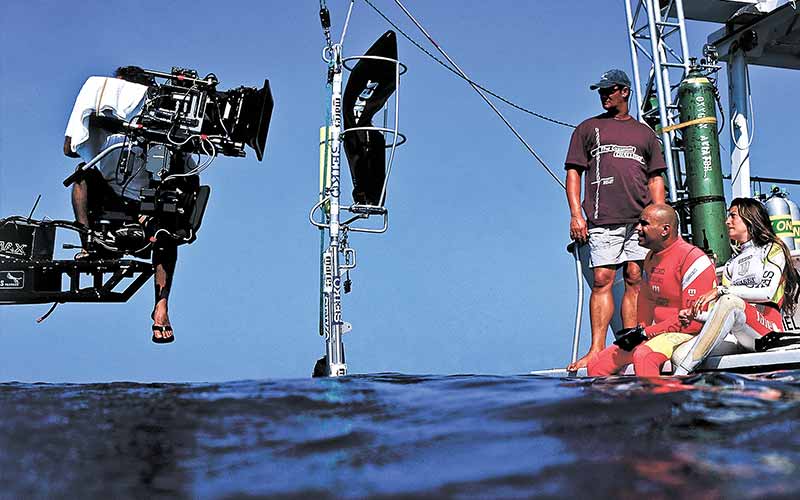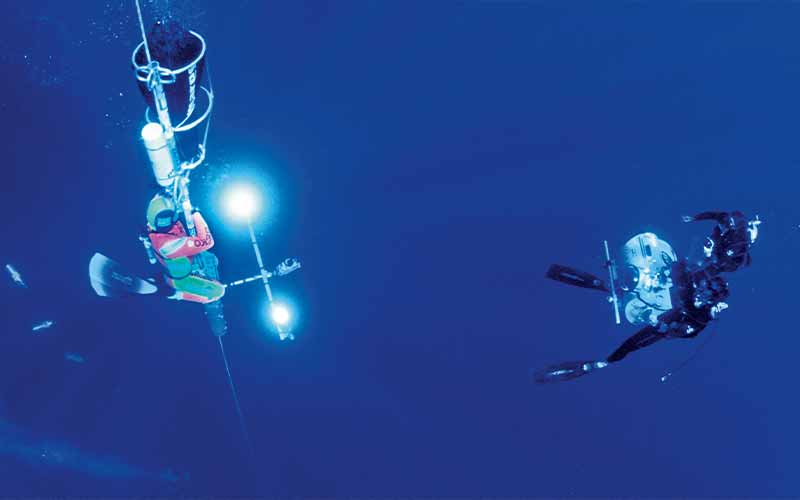Labor Day 2000 in Roatan was beautiful — calm winds, clear skies and clear water. A little problem equalizing didn’t seem like a big deal.
I was in the home stretch of filming OceanMen: Extreme Dive, an IMAX film about freediving champions Umberto Pellizari and Pipin Ferraras. My team and I had just completed eight weeks of intensive underwater work in the Bahamas and a few days of shooting aerials in Miami. The production had spanned more than a year and had taken us to six countries. We had filmed Umberto freediving through caves and Pipin winding through a wreck teeming with sharks.
We had made countless deep dives and had speedboats race over the camera just inches from the port. In Sardinia we placed Umberto on a 100-foot precipice with a helicopter, then we flew over him with the camera just clearing his head. In short, we had dodged a lot of bullets and were feeling confident that the worst was behind us when we arrived in Roatan.
After years of shooting wildlife, I thought directing a film centered on human subjects would be relatively simple. It wasn’t. My desire to create an immersive experience that put the audience right there with the divers required a lot of deep diving that limited bottom time and the number of dives we could make in a day. To keep the camera moving with the divers and the “no limits” sled, we had to create rigs that could handle the weight and mass of a 350-pound IMAX camera. With a camera that size, those rigs and everything that supported them had to be big and ponderous.

From the start, our production was plagued by technical problems. It was bad enough that a 1,000-foot magazine was good for only three and a half minutes of shooting. But when a camera failed on a 200-plus-foot dive, you were pretty much cooked for the day. Even with a lot of fallback plans to shoot shallow or topside, camera failures cost us 40 percent of our shooting days. By the time we arrived at Anthony’s Key for the last five days of filming, I was really feeling the heat.
On our first day, we scouted and blocked shots. My ears gave me some trouble, but it was nothing I couldn’t push through. My team and I made our way from one dive site to another, carefully planning each scene. Most of the day we were on scuba. By the afternoon we were all freediving. At that point, my ears had become very stubborn. Unfortunately, so had I. In decades of diving, I had aborted only one dive because I couldn’t clear. With so much on the line, I wasn’t about to let my ears slow us down now. I squeezed my nose tight and blew with everything I had.
I surfaced from a shallow dive feeling like my right ear was plugged. I shook my head a few times and kept diving. On the way back to the dock, the boat’s wake was loud and distorted, like plastic crackling in my ear. By dinner I had no hearing at all in my right ear. Deep in denial, I blew it off, sure that I would be fine the next day.
In the morning I still couldn’t hear a thing. I called my friend Thomas Balkany, M.D., a specialist in otolaryngology at the University of Miami. He knew a retired ear specialist on the island who was kind enough to come check me out. After evaluating me, he was adamant that I get to Miami immediately.

Reluctant to leave the shoot, I called Dr. Balkany again. He made it clear that with each passing hour the odds of me regaining any hearing diminished significantly. Our producer, Doug Merrifield, frantically called every commercial airline on the island trying to get me a flight to Miami. None was available until the following afternoon. Doug contacted DAN®. The medical specialist at DAN immediately understood the urgency of the situation, and within hours I was aboard a chartered aircraft flying low to Miami.
Despite the fact he was leaving the country early the next morning, Dr. Balkany was waiting for me when I arrived at his office late that night. As he reviewed my audiogram, his expression said it all. The prognosis was poor: little if any chance of regaining hearing in that ear. Another doctor stopped by the office. He glanced at my audiogram and said to me, “Wow, I’m really sorry.”
“You’re looking at his good ear,” Dr. Balkany said. I laughed, but in truth that was my lowest point.
The next morning one of Dr. Balkany’s colleagues operated on my ear, patching the oval and round windows of my cochlea. Not allowed to fly, I spent a long week in a Miami hotel. I was shocked at how disorienting it was to be deaf in one ear. I had absolutely no sense of the direction from which sound was coming.
At the end of the week I went in for a follow-up audiogram. I was disappointed but not surprised to see that it was unchanged. I flew home to Los Angeles.
Three days later my son and I were getting ready to spray paint something in the front yard. I shook the can with my left hand until the mixing ball came loose then switched it to my right. I stopped mid-shake. My son asked me what was wrong. I shook the can again and smiled. That stupid little ball bouncing off the sides of the can was music to my injured ear.
I regained partial, distorted hearing, although with it came a wicked case of tinnitus. I haven’t had a quiet moment in almost a decade now, but it’s worth the hearing. Thanks to prompt treatment, I was able to continue my career as an underwater filmmaker, and every time I hear the direction of a whale’s blow or the roar of surf in fog, I thank DAN for getting me off that island and Dr. Balkany for being there when I landed.
I often find myself repeating to my kids the lesson I learned from my pig-headed mistake: Nothing is a big deal until it is. Getting away with stupid risks and pushing limits empower us to do more boneheaded things until the odds catch up with us. If you’re lucky, you’ll only end up with a lifetime of ringing in your ear and the need to say “What?” 100 times a day.
If you’re smart, you’ll avoid getting into trouble in the first place. And if you’re really smart, you’ll be sure to have DAN there to back you up.
The Medic’s Perspective
Ear and sinus barotraumas are the most common injuries reported among divers. When a diver has difficulty equalizing and develops symptoms, he should stop diving. As the diver in this case illustrated, continued diving can worsen the symptoms. It is rare for ear barotrauma to cause chronic or permanent injury, but your recovery can be affected by how quickly you seek treatment. Not diving on a vacation is disappointing, but the consequences of worsening symptoms can affect travel home and, potentially, future diving. An evaluation by a physician is an important next step. The diver in the story wisely sought medical advice. Whether you are at home or traveling, DAN can provide emergency assistance, medical advice and referrals to physicians.
—Marty McCafferty, EMT-P, DMT-A, DAN medical information specialist
© Alert Diver — Q2 Spring 2010